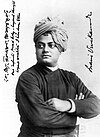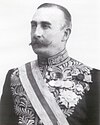Wikipedia:VideoWiki/Indian Institute of Science
| VideoWiki/Indian Institute of Science (Tutorial) | |
|---|---|
| Link to Commons | |
| Steps for video creation | |
| Step 1 | Preview my changes (10 sec) |
| Step 2 | Upload to Commons (10 min) |
Introduction[edit]
Indian Institute of Science or IISc is a public institute and deemed university in Bangalore, India, for research and higher education in science and engineering.[1]
Ranking in India[edit]
It is a premier scientific research institute in India and has been ranked 1st in the 'university' and 'overall' category for the last three consecutive years (2016–18) in the National Institutional Ranking Framework.

History[edit]
The initial conversation of research institute for science to be setup in India happened between Jamsetji Tata and Swami Vivekananda, on their voyage from Japan to Chicago in 1893.[2]


Provisional Committee[edit]
Tata constituted a Provisional Committee to prepare a plan for setting up of an institute of research and higher education. The committee presented a draft proposal to Lord Curzon on 31 December 1898.[3]

Location[edit]
Subsequently, Sir William Ramsay, a Nobel Laureate, was called on to propose a suitable place for such an institution who suggested Bangalore as the best location.[3]

Donors[edit]
Donors included Tata himself, Mir Osman Ali Khan, Krishnaraja Wodeyar IV, and the State of Karnataka.[3]

Approval[edit]
The constitution of the Institute was approved by the Viceroy, Lord Minto, and the necessary Vesting Order to enable it to function was signed on 27 May 1909.[3]

First batch[edit]
Early in 1911, the Maharaja of Mysore laid the foundation stone of the Institute, and on 24 July, the first batch of students were admitted to the Departments of General and Applied Chemistry under Norman Rudolf and Electro-Technology under Alfred Hay.[4]

Deemed stated[edit]
In 1958 the institute was granted the deemed university status by the UGC.[4]

Initial directors[edit]
At the time of the inception of IISc in 1909, Morris Travers, Sir William Ramsay's co-worker in the discovery of the noble gases, became its first Director. The first Indian Director was the Nobel Laureate Sir C V Raman.[3]

Campus[edit]
The IISc campus is located in the north of Bengaluru, about 4 kilometers from Bangalore City Railway Station and Kempegowda Bus Station, on the way to Yeshwantpur. The Institute is fully residential and is spread over 400 acres of land in the heart of Bengaluru city.[5]

Ranking[edit]
IISc was ranked 251–300 in the world by the Times Higher Education World University Rankings of 2018, the top institute in India, as well as 21 in Asian the 2018 ranking and 14 among BRICS & Emerging Economies University Rankings in 2017.[6]

QS World University Rankings[edit]
The QS World University Rankings of 2019 ranked IISc 170 in the world.[7]

Academic divisions, departments, and centres[edit]
There six major divisions in the university. They are divided according to various sciences-Biological Sciences, Chemical Sciences, Electrical Sciences, Mechanical Sciences, Physical and Mathematical Sciences, and Interdisciplinary Research. These are further divided into various departments and centres.[8]






Academic programs[edit]
Research students constitute more than 70% of the students on the campus. Ph D degrees offered in 40 different disciplines.[9] Research programs leading to doctoral degrees are the main thrust in many departments.[3]

Masters[edit]
Masters degrees offered by the institute are classified into two categories: degrees by coursework, awarding Master of Technology, Master of Management, and Master of Design, and degrees by research, awarding Master of Technology (by research).[3]

Competition[edit]
The two-year M Tech program is available in almost all engineering departments. Due to stiff competition, one needs a high percentile in the Graduate Aptitude Test in Engineering for admission into this program.[3]

Management Studies[edit]
The Department of Management Studies, one of the oldest management schools in the country (established in 1948), offers a Master of Management program exclusively for engineering graduates.[3]

Product Design and Manufacturing[edit]
The Center for Product Design and Manufacturing offers the Master of Design course. Started in 1996, the M Des program is a two-year, full-time postgraduate program.[10]
Bachelors[edit]
The first batch of undergraduate students was admitted in 2011. The program offers a four-year Bachelor of Science (by Research) and a five-year integrated Master of Science course in six disciplines: Biology, Chemistry, Environmental Science, Material Science, Mathematics, and Physics.

J. R. D. Tata Memorial Library[edit]
The library moved into the present premises in January 1965, built out of grants provided by University Grants Commission, in commemoration of the golden jubilee celebrations of the Institute in 1959. In 1995, the library was renamed as "J R D Tata Memorial Library".[11]

Budget[edit]
The annual budget of the library is over rupees 100 million[12] (almost US$2,500,000) of which subscription towards periodicals alone is about rupees 90 million.

Central computing facility[edit]
The Computer Centre, established in 1970 as a central computing facility, became Supercomputer Education and Research Centre (SERC) in 1990 to provide state-of-the-art computing facility to the faculty and students of the Institute.

Supercomputer[edit]
It houses India's first petascale supercomputer CrayXC-40 and also the fastest supercomputer in India.[13][14]

Academic and industrial collaborations[edit]
The Indian Institute of Science collaborates with various government organisations like the Indian Ordnance Factories, Defence Research and Development Organisation, Indian Space Research Organisation, and Bharat Electronics Limited.

Private[edit]
IISc also works in collaboration with private industry and research labs like the Google Inc, General Motors, Microsoft Research, IBM Research, Boeing, Robert Bosch Foundation.




Student activities[edit]
Pravega is the annual science, technology and cultural festival of Indian Institute of Science, Bangalore. Started in 2013 by the undergraduates of IISc, the fest is usually held on the third weekend of January.[15] Vijyoshi, an annual national science camp for secondary school and undergraduate students, is hosted by IISc.[16]

References[edit]
- ^ "Our Heritage" (PDF). Pursuit and Promotion of Science. Indian Institute of Science. p. 18. Retrieved 19 October 2012.
- ^ "President's Address at the Integrity India Campaign by the CII at Coimbator". Press Information Bureau, Government of India. 19 December 2006. Retrieved 15 June 2007.
- ^ a b c d e f g h i Warrier, BS (30 January 2012). "The IISc stamp on science research". The Hindu. Chennai, India. Archived from the original on 4 February 2013. Retrieved 22 August 2015.
- ^ a b "List of Institutions of higher education which have been declared as Deemed to be Universities as on 06.10.2017" (PDF). University Grants Commission. 6 October 2017. Retrieved 30 October 2017.
- ^ "In the heart of Bangalore". Retrieved 23 October 2012.
- ^ "World University Rankings 2018". Times Higher Education (THE). 18 August 2017. Retrieved 9 October 2019.
- ^ "QS World University Rankings 2019". QS World University. 1 February 2017. Retrieved 9 October 2019.
- ^ "Indian Institute of Science, Bangalore". www.iisc.ernet.in. Retrieved 16 November 2015.
- ^ Research Programmes, http://www.iisc.ac.in/admissions/research-programmes/
- ^ "CPDM, Indian Institute of Science". Cpdm.iisc.ernet.in. Retrieved 26 October 2012.
- ^ "About J R D Tata Memorial Library". Archived from the original on 19 February 2012. Retrieved 17 February 2012.
- ^ "About J R D Tata Memorial Library". Archived from the original on 19 February 2012. Retrieved 17 February 2012.
- ^ "SERC — India".
- ^ "ET — India".
- ^ "Get ready for Pravega", The Hindu
- ^ "National Science (VIJYOSHI) Camp 2014". 2015-02-19. Archived from the original on 19 February 2015. Retrieved 2015-12-16.
